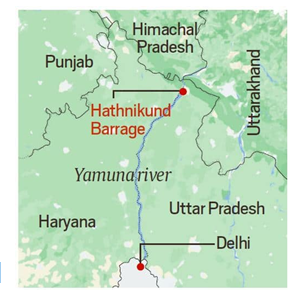

8th August 2023 (6 Topics)
Prelims Articles
Context
To prevent a repeat of the July floods caused by the Yamuna in Delhi and in adjoining areas of the river in Haryana, the Haryana government is planning to build a dam at a cost of Rs 6,134 crore.
About
What is the plan?
- The dam will have a 14-km-long reservoir and will be built 4.5 km upstream from the Hathnikund Barrage in Yamunanagar district.
- Nine villages will be displaced for its construction, besides shifting an 11-km stretch of NH-73.
- It will also submerge a large chunk of forest land, including areas in Kalesar National Park and Wildlife Sanctuary.
- The dam area also shares borders with Uttarakhand and Uttar Pradesh. Its reservoir will have a capacity of 10.82 lakh cusecs.
About Hathnikund barrage
- Built on the Yamuna river, the Hathnikund barrage is located on the border of Haryana's Yamuna Nagar and Saharanpur in Uttar Pradesh (UP).
- Yamuna water is allocated to Himachal Pradesh, Haryana, Delhi, Uttar Pradesh, and Rajasthan as per an MoU dated May 12, 1994.
- Water from the Hathnikund barrage is released in three directions:
- Eastern Yamuna Canal:diverted towards UP for irrigation purposes.
- Western Yamuna Canal:diverts water to different parts of Haryana for irrigation purposes.
- Yamuna river:After sending water to both the canals, there is a part that is left in the main river.
- The WYC takes Yamuna water to Haryana for irrigation and to Delhi for drinking. Its capacity is 20,000 cubic feet per second (CFS).
Why can’t the Haryana government store water at the HKB?
- Haryana have a barrage at Hathnikund and not a dam.
- A barrage is a man-made structure built on water courses or rivers to facilitate and control diversion of water into canals for navigation or irrigation.
- A dam collects water, especially to make a reservoir.
- The HKB’s main function is to divert Yamuna’s water to the canals.
Benefits
- Economic Significance:Once the project is completed, the state will get a financial advantage of Rs 497 crore through availability of additional irrigation water, groundwater recharge and aquaculture, apart from generation of 250 MW electricity.
- Improving intensity of irrigation water: The water stored in the reservoir will improve intensity of irrigation water in the existing canals of Western Jamuna Canal (WJC).
- Flood-proofing:After the execution of the project, flood water will be stored in the reservoir. It will not only save Delhi and Yamuna’s adjoining areas in Haryana from floods.


Editorials
Context
The DPDP Bill 2023, which was introduced in the Lok Sabha recently, is an outcome of the debate around the ‘right to privacy’.
Tussle between Rights
- Personal data made vulnerable- There are some tensions between the right to information and the right to privacy.It makes the citizens personal data vulnerable in the name of transparency and the new bill doesn’t resolve these questions.
- Definition made broad and vague- The bill defines “lawful purposes” in the broadest possible manner as “any purpose which is not expressly forbidden by the law”.
- Privileges to the Central Government- It allows the central government to ask the Board, data ?duciary or others to “furnish such information as it may call for”.It makes our data fair game for both government and private entities.
Undermining the Right to Information
- RTI Act -Section 8(1)(j) grants exemption from disclosure if the information which relates to personal information sought “has no relationship to any public activity or which would cause unwarranted invasion of the privacy of the individual”.
- Diluting the RTI’s section- The DPDP Bill 2023 suggests replacing Section 8(1)(j) of RTI Act with just “information which relates to personal information”.
- It’s Impact- The current requirement for public servants to disclose their immovable assets will likely be o? limits. This is indeed “information related to personal information”, but it serves a larger public interest.
Other Shortcomings
- Government Intervention-The Data Protection Board, an oversight body will be under the boot of the government as the chairperson and members are to be appointed by the central government.
- Difficulty in seeking legal help- A weak board combined with the lack of universal literacy mean that the chances that citizens will be able to seek legal recourse when privacy harms are in?icted on them are slim.
- Right to privacy at stake- DPDP Bill 2023 ends up undermining our right to information, without doing much to protect our right to privacy.





